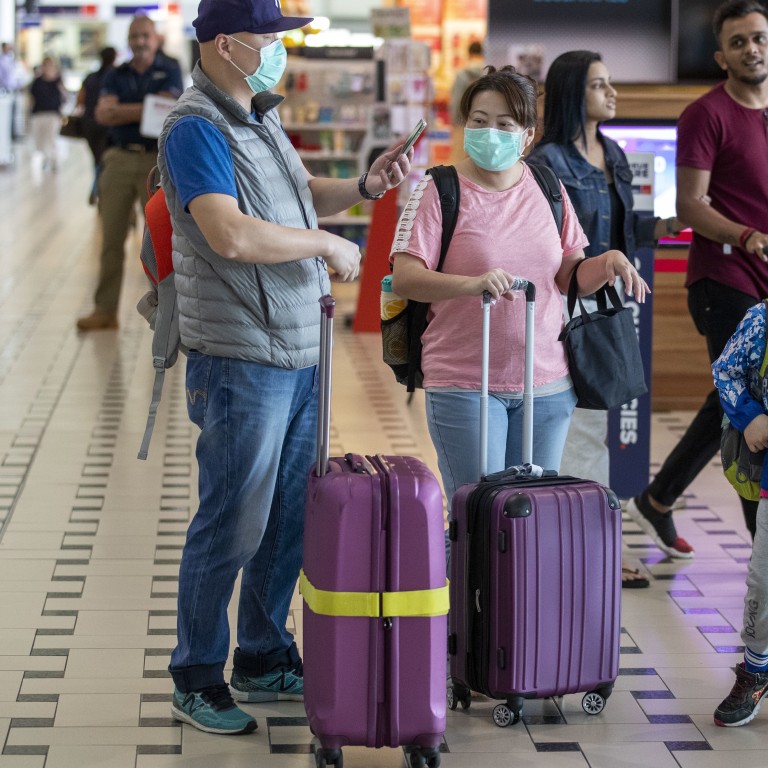
Coronavirus: China slams Australia’s ‘extreme measures’ after travel ban extended
- Australia has prevented people from mainland China from entering, at least until February 22, leaving Chinese students stranded and damaging tourism
- Nearly 1.5 million Chinese nationals visited Australia in 2018-19, official records show, accounting for about one in eight arrivals
After Prime Minister Scott Morrison on Thursday announced the restriction, originally due to expire on Saturday, would be in place for at least an extra week, the Chinese embassy in Canberra issued a statement expressing its “deep regret and dissatisfaction”.
“Only Australia and a small number of countries have taken such extreme measures which are overreaction indeed,” it said. “China has taken the most comprehensive and rigorous prevention and control measures, many of which far exceed the requirements of the International Health Regulations and WHO recommendations.”
Universities with thousands of Chinese students brace for pain from coronavirus travel bans
Australia’s home affairs minister Peter Dutton defended the decision.
“Of course we want to work very closely with the Chinese Government but our responsibility is to make sure that we keep Australians safe,” he told local media. “The advice from the CMO yesterday, who met with all of the CMOs from the states and territories, was clear and that is that the travel ban should be extended.
“The numbers are now over 60,000 and 1,370 deaths as at this morning. But we will assess it week by week and we will do what’s in our country’s best interest.”
Universities Australia chief executive Catriona Jackson told the Australian Broadcasting Corporation universities were trying to find solutions to accommodate international students.
Stranded Chinese students upset after Australia’s coronavirus travel ban
“We’re extending as many options to them as we possibly can, with the central aim of giving them some sort of certainty,” she said. “These students are in a very difficult situation and are clearly really stressed.
“They are not sure what is happening in terms of health in their own country and the overwhelming feeling we get is they are just desperate to get back here and get back on with their education and we will welcome them back absolutely with open arms the moment it is safe to do so.”
Treasurer Josh Frydenberg has warned the nation – the world’s most China-dependent developed economy – faces a “significant” impact to its bottom line in sectors including tourism, education and agriculture.
Australian tourism relies on Chinese visitors for a quarter of international spending. Nearly 1.5 million Chinese nationals visited Australia in 2018-19, Australian Bureau of Statistics records show, accounting for about one in eight arrivals.
Chinese-Australians feel fear and loathing as coronavirus panic sparks racist incidents
With Chinese tourists spending about A$12 billion (US$8 billion) in Australia each year, according to Tourism Research Australia, every month the travel ban remains in place could amount to billion-dollar losses for the sector.
More than 50 countries or territories have imposed travel restrictions and tightened visa requirements to contain the novel coronavirus this month, according to the International Air Transport Association.
Establishments in Melbourne and Sydney have reported a decline in trade of more than 70 per cent over the recent weeks, and the economic impact has already forced some to close, local media reported.
Australians avoid Chinese restaurants amid coronavirus fears, fake news
Australia has also evacuated hundreds of citizens and permanent residents, most of them Chinese-Australians, from Wuhan, before placing them in quarantine on Christmas Island, a remote Australian territory known for its use in the controversial offshore processing of asylum seekers.
Ties between Beijing and Canberra have been strained in recent years, after Australia – a strong ally of the US – banned Huawei from building its 5G network and passed anti-foreign interference laws that aim to stop meddling in its government, media and universities.
Purchase the China AI Report 2020 brought to you by SCMP Research and enjoy a 20% discount (original price US$400). This 60-page all new intelligence report gives you first-hand insights and analysis into the latest industry developments and intelligence about China AI. Get exclusive access to our webinars for continuous learning, and interact with China AI executives in live Q&A. Offer valid until 31 March 2020.

